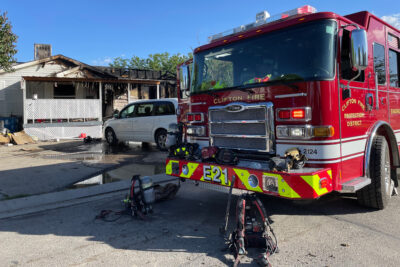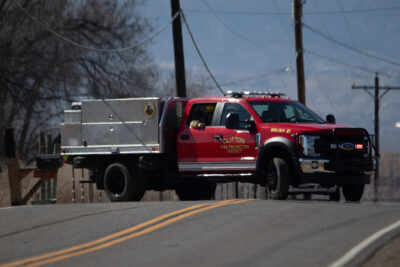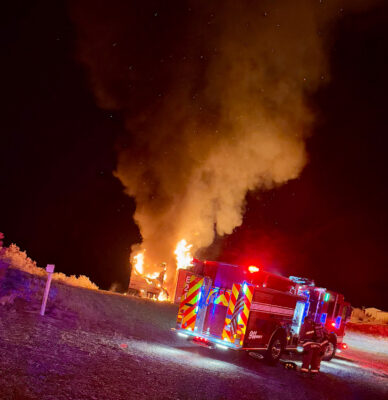
By Brandon Leuallen, The Business Times
As the unincorporated community of Clifton continues to grow, the Clifton Fire Protection District, one of the busiest single-station fire departments in Colorado, is weighing a 1 percent sales tax proposal for the ballot this fall. The fire district will use the money to fund construction of two stations, increase staffing, equipment and emergency coverage, and create a dedicated wildland fire team.
Clifton Fire Chief Brian Cherveny said the tax would allow the district to replace its aging 1980s-era headquarters and build a new satellite station in the southern part of its 15-square-mile service area, which has approximately 35,000 residents. The boundary runs from Interstate 70 to the Colorado River north to south, and from 35 Road to 30 Road east to west.
“We’re at least in the top five busiest single stations in the state,” Cherveny said. “That’s a lot out of a single station, and it doesn’t serve the community very well when some of our call volume is growing in the southern area and we’re not located there.”
Cherveny said the fire district has long enjoyed strong backing from the people it serves.
“We’ve always felt very supported by our constituents here, and that means a lot when we’re looking at something like this sales tax proposal,” he said.
Separate from Grand Junction’s Station 7
One challenge in informing the community about the ballot measure is overcoming skepticism from a prior bond issue in the City of Grand Junction. That story was previously covered by The Business Times in “New GJ fire station may open without staff.”
Approved by voters in 2019, the measure funded construction of three fire stations but did not end up providing staffing for Fire Station 7 as promised. Fire Station 7 is located in the Appleton area, across from Appleton Elementary School and about 5.1 miles east of Grand Junction Regional Airport, according to Google Maps.
Fire Station 7 is Grand Junction’s only fire station north of Interstate 70.
In Clifton’s case, the Clifton Fire Protection District operates independently from the Grand Junction Fire Protection District and has its own budget. The area it serves and the proposed sales tax have no connection to Fire Station 7.
Strong Operations, Limited Capital Funding

According to documents posted by the fire district, Clifton Fire has worked in recent years to rebuild its reserve fund for emergencies for vehicles and equipment and is in solid fiscal condition for operating at its current level. However, that stability does not extend to major capital needs such as new buildings to meet growing demand.
“We’re in good shape to keep operating as we are,” Cherveny said. “But we don’t have the funding to replace or build new stations as demand increases.”
That demand comes not only from Clifton’s growth, but also from serving neighboring areas through automatic and mutual-aid agreements.
“We’re one of the busiest stations in the state, Clifton is growing, and we also provide services into neighboring areas,” Cherveny said.
Cherveny noted Clifton Fire is the major EMS provider for the area, including for neighboring fire stations without EMS services.
“Eighty-eight to 90 percent of what we do is EMS,” he said.
Reasons a New Station is Needed
The current station, built in the late 1980s, was designed for a volunteer department and has been remodeled several times, but it still lacks modern facilities for decontaminating gear, training personnel and housing a full-time crew, according to the fire district’s facility assessment.
A second station in the southern district, likely near 32 Road and D Road, would improve response times for emergencies, water rescues and mutual-aid calls into East Orchard Mesa, Grand Junction and the Mesa County Fire Authority area.
“We’re the closest boat to the Corn Lake ramp,” Cherveny said. “Having a boat closer to that ramp would improve our water-rescue capabilities.”
Mutual Aid and Cooperation

Cherveny said Clifton maintains a strong working relationship with the Grand Junction Fire Department, responding together frequently through automatic and mutual-aid agreements.
Grand Junction Fire Station 8 is located on 31 Road just south of D 1/2 Road and doesn’t have EMS services. Cherveny said Clifton Fire answers the EMS Calls in the area where both boundaries cross over, and Grand Junction Fire Station 8 also helps on fires in Clifton Fire’s district under the agreement.
“We work really well with Grand Junction Fire,” he said. “Even though we’re separate districts, we’re helping each other constantly. That’s important for the community. People don’t care whose name is on the side of the truck when they call 911.”
Funding Limits and the Push for a Sales Tax
Clifton’s funding currently comes from an 11.552-mill property tax levy, according to Mesa County Assessor records. Cherveny said recent statewide property-tax-relief measures have slowed the growth of that revenue, which affects the district’s ability to replace and add facilities.
“As a property owner, I’m glad for that relief,” he said. “But as the chief of a department that relies on property-tax income, that one’s pretty rough.”
Clifton also has no city-level property tax, meaning residents pay lower property taxes than those in incorporated parts of Grand Junction or other municipalities, because the community falls within the county.
Until recently, Colorado law gave fire districts only one option, property taxes, to generate revenue. A change in state law now allows special districts to seek voter approval for sales taxes, according to the Colorado Department of Local Affairs.
“We don’t feel like we want to ask the property owners for more of the mill,” Cherveny said. “A sales tax doesn’t just ask property owners to fund this. It’s shared by anybody spending money in the district, including visitors.”
Cherveny said the board is committed to keeping Clifton’s sales-tax rate lower than neighboring communities to ensure the area remains an economical place to shop.
Another Funding Challenge at the Boundary
When asked about the city of Grand Junction annexing property, Cherveny said that when Grand Junction annexes property, the city collects the property tax rather than Clifton, while Clifton Fire continues providing EMS service in the area without the property tax revenue from those properties.
High Call Volume and Staffing Challenges
Clifton Fire responded to roughly 4,400 calls in 2023, with nearly nine out of 10 being medical emergencies, according to district call logs. The district runs two fully staffed ambulances daily and is working toward adding a third during peak hours, along with an engine crew that also covers aerial apparatus and brush-truck duties.
Currently, the station is unable to help much with wildfires in the area.
“We have 21 full-time line employees split across three shifts, which is seven per shift,” Cherveny said. “I have to be really careful about how I manage those people. A new station would mean more staffing, better distribution of resources and the ability to form a dedicated wildland fire team.”
He said career staff frequently cover calls when volunteers are unavailable, further underscoring the need for consistent, fully staffed crews.
“Our people step in and handle those calls when volunteers can’t respond,” he said.
Cherveny said the sales tax would allow Clifton Fire to create a separate wildland team that could respond locally and statewide without reducing local coverage. Deployment costs and backfill would be reimbursed by the hosting agency or state.
The Sales Tax Proposal
If approved, Clifton’s 1 percent sales tax would apply only within the district and is expected to raise about $2.5 million annually, according to district budget projections.
Clifton’s current combined sales tax rate is 5.27 percent. With the increase, Clifton’s total sales tax rate would remain below that of Grand Junction (8.66 percent) and Palisade (7.27 percent), based on Colorado Department of Revenue tax rate tables.
Next Steps
The proposal is still in the planning phase, and the district board is expected to finalize ballot language in the coming months. Voters inside the Clifton Fire Protection District would then decide whether to approve the tax.
“It will be a challenge for us if we don’t get this initiative,” Cherveny said. “We wouldn’t be able to provide the second station, and we’d still have those longer emergency response times in that area. Clifton is growing, and we want to make sure our services grow with it.”
According to cliftonfire.com, Clifton Fire is a Colorado Title 32 Special District and is managed by a board of directors elected from the property owners within the Clifton Fire District.
Board meetings take place once a month, at 6 p.m. on the third Wednesday of each month, at the Clifton Fire District Station. The voters of the District voted to implement an 11.552 mill levy in 2017.

